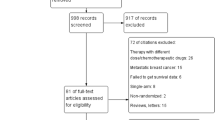Abstract
Increasing the dose intensity of cytotoxic therapy by shortening the intervals between cycles may enhance efficacy. Dose-dense chemotherapy, which is adopted as adjuvant chemotherapy of high-risk breast cancer, is addressed in the Japanese Breast Cancer Society Clinical Practice Guideline for breast cancer, 2018 edition (in Japanese). To evaluate the benefits and safety of dose-dense adjuvant chemotherapy described in the guideline, we performed a systematic review and meta-analysis of data of randomized trials using the same drugs, doses, and numbers of cycles. The PubMed, Cochrane Library, and Ichushi-Web databases were searched for relevant publications reporting randomized trials published until November 2016. Overall survival (OS), disease-free survival (DFS), and toxicity were assessed. Three trials comprising 5190 patients were included. Compared with conventional chemotherapy, dose-dense chemotherapy lengthened OS (RR = 0.76; 95% CI = 0.64–0.90) and DFS (RR = 0.83; 95% CI = 0.75–0.92) and increased the risk of anemia (RR = 4.56; 95% CI = 2.01–10.34). We conclude that dose-dense chemotherapy can be highly recommended as adjuvant chemotherapy for patients with breast cancer with a high risk of recurrence risk and sufficient bone marrow function.




Similar content being viewed by others
References
Early Breast Cancer Trialists’ Collaborative Group (EBCTCG), Peto R, Davies C, Godwin J, Gray R, et al. Comparisons between different polychemotherapy regimens for early breast cancer: meta-analyses of long-term outcome among 100,000 women in 123 randomised trials. Lancet. 2012;379:432–44.
Norton L, Simon R. Tumor size, sensitivity to therapy, and design of treatment schedules. Cancer Treat Rep. 1977;61:1307–17.
Norton LA. A Gompertzian model of human breast cancer growth. Cancer Res. 1988;48(24, pt 1):7067.
Del Mastro L, De Placido S, Bruzzi P, De Laurentiis M, Boni C, et al. Fluorouracil and dose-dense chemotherapy in adjuvant treatment of patients with early-stage breast cancer: an open-label, 2 × 2 factorial, randomised phase 3 trial. Lancet. 2015;385:1863–72.
Venturini M, Del Mastro L, Aitini E, Baldini E, Caroti C, et al. Dose-dense adjuvant chemotherapy in early breast cancer patients: results from a randomized trial. J Natl Cancer Inst. 2005;97:1724–33.
Citron ML, Berry DA, Cirrincione C, Hudis C, Winer EP, et al. Randomized trial of dose-dense versus conventionally scheduled and sequential versus concurrent combination chemotherapy as postoperative adjuvant treatment of node-positive primary breast cancer: first report of Intergroup Trial C9741/Cancer and Leukemia Group B Trial 9741. J Clin Oncol. 2003;21:1431–9.
Foukakis T, von Minckwitz G, Bengtsson NO, Brandberg Y, Wallberg B, et al. Effect of tailored dose-dense chemotherapy vs standard 3-weekly adjuvant chemotherapy on recurrence-free survival among women with high-risk early breast cancer: a randomized clinical trial. JAMA. 2016;316:1888–96.
Burnell M, Levine MN, Chapman JA, Bramwell V, Gelmon K, et al. Cyclophosphamide, epirubicin, and fluorouracil versus dose-dense epirubicin and cyclophosphamide followed by paclitaxel versus doxorubicin and cyclophosphamide followed by paclitaxel in node-positive or high-risk node-negative breast cancer. J Clin Oncol. 2010;28:77–82.
Therasse P, Mauriac L, Welnicka-Jaskiewicz M, Bruning P, Cufer T, et al. Final results of a randomized phase III trial comparing cyclophosphamide, epirubicin, and fluorouracil with a dose-intensified epirubicin and cyclophosphamide + filgrastim as neoadjuvant treatment in locally advanced breast cancer: an EORTC-NCIC-SAKK multicenter study. J Clin Oncol. 2003;21:843–50.
von Minckwitz G, Raab G, Caputo A, Schütte M, Hilfrich J, et al. Doxorubicin with cyclophosphamide followed by docetaxel every 21 days compared with doxorubicin and docetaxel every 14 days as preoperative treatment in operable breast cancer: the GEPARDUO study of the German Breast Group. J Clin Oncol. 2005;23:2676–85.
Kojimahara N, Nakayama T, Morizane T, Yamaguchi N, Yoshida M. Minds manual for guideline development. Ver. 2.0. Tokyo: Japan Council for Quality Health Care; 2016.
Shea BJ, Hamel C, Wells GA, Bouter LM, Kristjansson E, et al. AMSTAR is a reliable and valid measurement tool to assess the methodological quality of systematic reviews. J Clin Epidemiol. 2009;62:1013–20.
Bonilla L, Ben-Aharon I, Vidal L, Gafter-Gvili A, Leibovici L, et al. Dose-dense chemotherapy in nonmetastatic breast cancer: a systematic review and meta-analysis of randomized controlled trials. J Natl Cancer Inst. 2010;102:1845–54.
Funding
This meta-analysis was performed as one of the activities by Japanese Breast Cancer Society.
Author information
Authors and Affiliations
Corresponding author
Ethics declarations
Conflict of interest
Tetsuhiro Yoshinami received honoraria from Chugai, Kyowa Kirin, Novartis and Pfizer. Kei Koizumi received honoraria from Pfizer, Chugai, Eisai, Eli Lilly, Novartis, AstraZeneca, Merck Serono, Genomic Health, Allergan Japan, Kyowa Kirin, Daiichi Sankyo and Taiho. Shigenori E. Nagai received research funding from Chugai and Nippon Kayaku, and honoraria from Chugai, Novartis, Pfizer, Eli Lilly, Eisai and Taiho. Tatsuya Toyama received research funding from Chugai, Novartis, Eisai and AstraZeneca and honoraria from Chugai, Novartis, Eisai, AstraZeneca, Lilly, Kyowa Hakko Kirin, Taiho, Daiichi Sankyo, Nippon Kayaku, Pizer and Takeda. Hiroji Iwata received research funding from Chugai, Novartis, MSD and Lilly, honoraria from Chugai, AstraZeneca and Daiichi Sankyo, and serves as an advisory board to Daiichi Sankyo, Chugai, Lilly, Kyowa Hakko Kirin, Pfizer, Novartis and AstraZeneca.
Ethical approval
For this type of study, formal consent is not required.
Informed consent
For this type of study, formal consent is not required.
Additional information
Publisher's Note
Springer Nature remains neutral with regard to jurisdictional claims in published maps and institutional affiliations.
Tetsuhiro Yoshinami, Kei Koizumi, Shigenori E. Nagai, Tatsuya Toyama, Hiroji Iwata: the Japanese Breast Cancer Society Clinical Practice Guideline for systemic treatment of breast cancer panel membership.
About this article
Cite this article
Yoshinami, T., Koizumi, K., Nagai, S.E. et al. Dose-dense adjuvant chemotherapy: a systematic review and meta-analysis of the Japanese Breast Cancer Society Clinical Practice Guideline, 2018 edition. Breast Cancer 27, 334–339 (2020). https://doi.org/10.1007/s12282-019-01039-1
Received:
Accepted:
Published:
Issue Date:
DOI: https://doi.org/10.1007/s12282-019-01039-1




